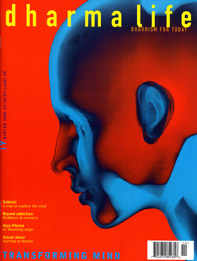Opening to You
Zen-Inspired translations of the Psalms
Norman Fischer
Viking Compass 2002
$19.95/£13.69 h/b
This extraordinarily refreshing and stimulating book deserves a wide readership, but I fear it won't receive it. Jews and Christians may avoid it since they regard the Psalms as their own territory, and may wonder what right a Zen Buddhist has to trespass there. Buddhists, on the other hand, may wonder why one of their number should bother with these ancient Jewish hymns, emanating – as they do – from a passionate, theistic, rather anthropomorphic spirituality, very remote from the serene smile of the Buddha. It would be a great pity if this book were neglected by all on such grounds, for it has much to offer on every level.
Firstly, it makes enjoyable reading simply on the purely literary and aesthetic level as poetry that is full of powerful language, vivid imagery and the freshness and directness of its American English. It gains much from being read aloud; the lines are rolling and sonorous. As poetry it can be enjoyed by anyone, whatever spiritual tradition they follow.
Nevertheless, I do not think Norman Fischer intends his work to be savoured on the literary level alone. It is the fruit of his own spiritual search; it is, indeed, an instrument he has used in that search. He is hoping that for us, too, whether Jewish, Christian or Buddhist, it may serve as an instrument in our own spiritual practice.
As a Catholic Benedictine I can only speak confidently on its value to Christians – and perhaps Jews as well. On its value for Buddhists – great though I think that is – I must necessarily speak more tentatively.
In his Introduction Fischer outlines the rather singular situation he finds himself in, which has led him to undertake this translation. He is of Jewish origin, and as a child learned how to chant the Psalms in their original Hebrew, though he did not understand the meaning of the words. His lifelong spiritual practice, however, has been Zen sitting meditation, of which he is a respected teacher. Now, in later life, his heart and mind purged and rinsed, so to speak, by Zen practice, he has looked again at his Jewish roots, seeking to understand them in the light of his Zen practice.
He insists that he has tried to widen and enhance his Zen consciousness by including the Psalms in it. He has conferred at length with Rabbis and Christian monks to try to understand what the Psalms mean to those whose spiritual practice is based upon them. He has relied heavily on the work of previous translators, and in that sense he has produced a 'version' rather than a 'translation'. So there can be no question of his having simply 'projected' a Buddhist view onto a non-Buddhist text. Rather, he has entered a 'dialogue' with that text, respecting its 'otherness' – such respect being intrinsic to all true dialogue.
Fischer writes: 'Buddhism isn't only Buddhism if it is truly Buddhism'. I understand him to mean that if Buddhism is to be true to itself it must be prepared to open up to perceptions and insights from other traditions, outside and beyond the particular context within which Buddhism historically developed. I would reply that Christianity, too, isn't only Christianity if it is truly Christianity. If, as a Catholic Benedictine, I read a Buddhist text, I try to do so with the same openness of spirit, fully recognising the 'otherness' of that text and the tradition which it expresses, seeking to have my Christian consciousness deepened and widened thereby.
I do not, therefore, recommend this book to academic Scripture scholars, who would quibble with much of it. Fischer is aware of traditional scholarly opinion, but not bound by it. He does not, in my opinion, do violence to the text nor distort its meaning; but he does allow himself great freedom in his interpretation. For ordinary practising Christians, however, this will not be an obstacle, but rather refreshing and stimulating. To them I recommend this book as lectio divina, or meditative, spiritual reading, leading on to contemplation and wordless, imageless prayer – that element in Christian practice which comes closest to Zen meditation.
This book has emerged from meditation practice, and therefore works well as a private contemplative support, rather than as a text for liturgical and communal chanting. The Christian reader should expect a few surprises, even a few shocks. Familiar themes of the Psalms – Law, Covenant, Chosenness, Israel, Zion, Kingship – acquire a new and powerful resonance when seen through Zen eyes.
On the value of these Psalms for Buddhists I am not qualified to speak. Nor do I need to, since Fischer explains his view that western Buddhists, though they are Buddhists, remain westerners, and therefore have inherited, psychically and culturally, a certain degree of Judeo-Christian sensibility. The Psalms can help them to be conscious of this and work with it. There is also the question of suffering and injustice – a theme that runs through the Psalms with terrible insistence, and which is handled there in a manner quite different from that found in Buddhist texts, but which speaks powerfully to westerners in the modern world.
To all serious seekers, whether Jewish, Christian or Buddhist, I recommend the use of this book in their personal practice.
Cyprian Smith ODB is a Benedictine monk who teaches at Ampleforth Abbey, England. He is author of The Way of Paradox: Spiritual Life as taught by Meister Eckhart



